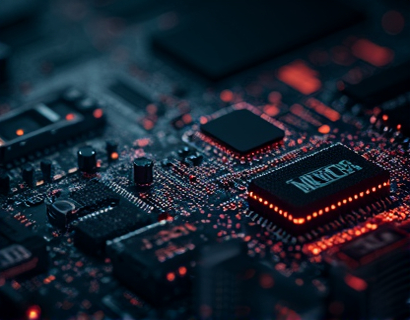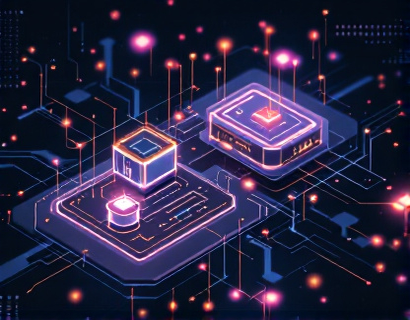Transforming Productivity in the Digital Age: The Synergy of Crypto and AI
The integration of cryptocurrency and artificial intelligence (AI) is revolutionizing the way we approach digital productivity. This synergy is not just about combining two advanced technologies but about creating a new paradigm where efficiency, innovation, and security converge to enhance user experiences. For tech professionals and enthusiasts, understanding how these technologies interact and complement each other is crucial for staying ahead in the rapidly evolving digital landscape.
The landscape of digital tools and applications is undergoing a significant transformation, driven by the power of blockchain and machine learning. These technologies are not only reshaping traditional industries but also giving rise to new opportunities in areas such as finance, supply chain management, healthcare, and beyond. This article delves into the latest tools and applications that leverage the strengths of both crypto and AI, providing a comprehensive guide for those looking to maximize their digital productivity.
Understanding Cryptocurrency and AI
Cryptocurrency, often associated with digital currencies like Bitcoin and Ethereum, is built on blockchain technology. Blockchain provides a decentralized, transparent, and secure way to conduct transactions without the need for intermediaries. This technology ensures that data is immutable and tamper-proof, which is essential for building trust in digital interactions.
Artificial intelligence, on the other hand, involves the simulation of human intelligence processes by machines, particularly computer systems. These processes include learning (the acquisition of information and rules for using it), reasoning (using rules to reach approximate or definite conclusions), and self-correction. AI can analyze vast amounts of data, identify patterns, and make predictions or decisions with minimal human intervention.
The combination of these two technologies creates a powerful toolset for enhancing productivity. Cryptocurrency can facilitate secure and transparent transactions, while AI can optimize these transactions by providing insights, automating processes, and enhancing user experiences. Together, they form a synergistic force that is transforming the digital world.
Enhancing Security and Trust
One of the most significant benefits of integrating cryptocurrency and AI is the enhancement of security and trust in digital transactions. AI algorithms can detect and prevent fraudulent activities by analyzing transaction patterns and identifying anomalies in real-time. This proactive approach to security is crucial in a world where cyber threats are becoming increasingly sophisticated.
Smart contracts, a key feature of blockchain technology, can be enhanced with AI to automate and enforce contractual obligations more efficiently. AI can ensure that all conditions of a smart contract are met before executing the transaction, reducing the risk of disputes and errors. This combination not only speeds up processes but also builds greater trust among users.
Optimizing Operational Efficiency
AI-driven tools can significantly optimize operational efficiency in various industries. For instance, in supply chain management, AI can predict demand, optimize inventory levels, and streamline logistics. When integrated with cryptocurrency, these processes can be executed securely and transparently, ensuring that all parties involved have real-time access to accurate data.
In the financial sector, AI can analyze market trends and provide insights for investment decisions, while cryptocurrency offers a decentralized and secure platform for trading. This synergy allows for faster and more secure financial transactions, reducing the need for intermediaries and lowering transaction costs.
Personalized User Experiences
AI's ability to analyze vast amounts of data makes it an excellent tool for creating personalized user experiences. By understanding user preferences and behaviors, AI can tailor recommendations, content, and services to individual needs. When combined with cryptocurrency, these personalized experiences can be monetized in innovative ways.
For example, AI can manage digital identities and permissions on a blockchain, ensuring that users have control over their data and can choose how it is used. This not only enhances privacy but also creates new revenue streams through data sharing and monetization, all while maintaining security and transparency.
Automating Repetitive Tasks
One of the most immediate benefits of AI in digital productivity is the automation of repetitive and time-consuming tasks. AI can handle routine operations such as data entry, report generation, and customer support, freeing up human resources for more strategic and creative work. When these tasks are executed on a blockchain, they are recorded immutably, ensuring accountability and traceability.
Smart contracts can automate complex workflows by triggering actions based on predefined conditions. For instance, a smart contract can automatically release payment to a supplier once the delivery is confirmed and verified by AI-driven sensors. This seamless integration of AI and blockchain reduces manual intervention and speeds up processes.
Enhancing Data Analytics
AI's strength lies in its ability to process and analyze large datasets, providing valuable insights that can drive decision-making. When combined with the secure and transparent nature of blockchain, these insights can be trusted and acted upon with confidence. AI can analyze transaction data, market trends, and user behavior to offer predictive analytics and actionable recommendations.
For businesses, this means better-informed decisions, improved customer insights, and enhanced competitive advantage. In the context of cryptocurrency, AI can help manage and optimize decentralized finance (DeFi) protocols, ensuring that they operate efficiently and securely.
Challenges and Considerations
While the integration of cryptocurrency and AI offers numerous benefits, it also comes with challenges that need to be addressed. One of the primary concerns is the regulatory landscape. As these technologies continue to evolve, regulatory frameworks are still catching up, leading to uncertainty and potential legal risks.
Another challenge is the technical complexity involved in integrating these technologies. Developers and organizations need to have a solid understanding of both blockchain and AI to implement solutions effectively. Additionally, there is a need for standardization to ensure interoperability and ease of use.
Privacy is another critical issue. While blockchain provides transparency, it can also expose sensitive information if not properly managed. AI, with its data-driven nature, must handle user data responsibly to maintain trust and comply with privacy regulations.
Future Prospects
The future of digital productivity is bright, with the integration of cryptocurrency and AI poised to drive significant advancements. As technology continues to mature, we can expect more innovative applications and tools that further enhance efficiency and innovation.
Decentralized applications (dApps) are likely to become more prevalent, offering users greater control and security. The convergence of AI and blockchain will also lead to the development of more sophisticated AI models that can operate on decentralized networks, opening up new possibilities in areas such as AI ethics and fairness.
Moreover, the rise of Web 3.0, a decentralized internet powered by blockchain, will create a more open and user-centric digital environment. AI will play a crucial role in making this vision a reality, ensuring that the web is not only more secure and efficient but also more intuitive and personalized.
Conclusion
The integration of cryptocurrency and AI is transforming productivity in the digital age, offering a range of tools and applications that enhance efficiency, security, and user experiences. By leveraging these advanced technologies, tech professionals and enthusiasts can stay ahead of the curve and capitalize on the opportunities presented by the future of digital solutions. As the landscape continues to evolve, staying informed and adaptable will be key to success in this exciting new era.










































